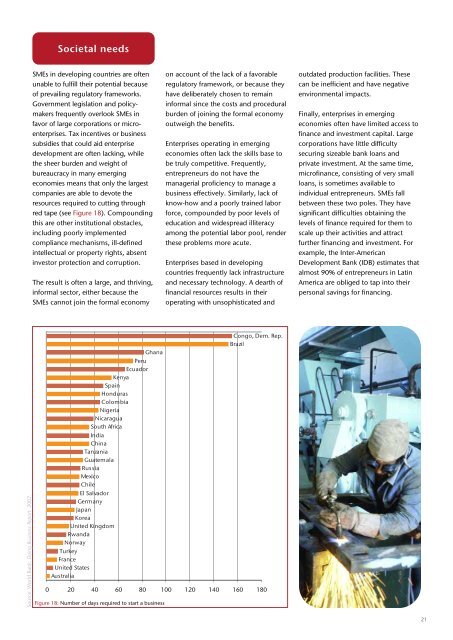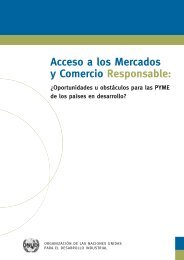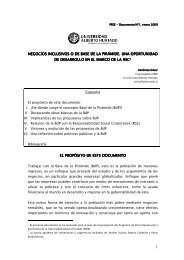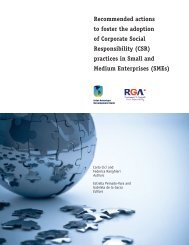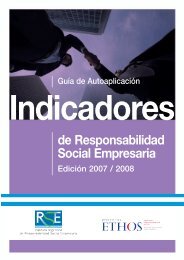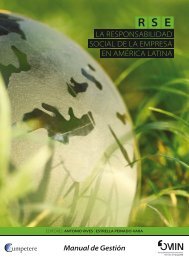Enterprise<strong>de</strong>velopment“<strong>Business</strong> is <strong>the</strong> most importantengine of economic change. Itbrings employment, goods,revenues, knowledge and skills<strong>de</strong>velopment. We must alsorecognize that <strong>the</strong> most importantrole is probably not that played by<strong>the</strong> multinationals, but by <strong>the</strong> smalland medium enterprise sector, <strong>the</strong>SMEs. We as global companies canprovi<strong>de</strong> <strong>the</strong> catalyst to partner <strong>with</strong>SMEs to mutual benefit. We canaccess <strong>the</strong>ir local expertise andmarkets; <strong>the</strong>y can access ourtechnologies and business skills forlocal momentum.”Michael Pragnell, CEO, SyngentaThe global viewLocal entrepreneurs, microenterprisesand small and mediumenterprises (SMEs) form <strong>the</strong>backbone of global economicactivity. These are small firms,<strong>de</strong>fined ei<strong>the</strong>r by <strong>the</strong>ir headcount –between 10 and 500 employees – orby <strong>the</strong>ir turnover. In OECDeconomies, <strong>the</strong>y account for 95% offirms, 60%-70% of employment,55% of GDP and generate <strong>the</strong> lion’sshare of new jobs (see Figure 16).In <strong>de</strong>veloping countries, more than90% of firms outsi<strong>de</strong> <strong>the</strong> agriculturalsector are SMEs and microenterprises.They generate asignificant portion of GDP. 25SMEs contribute to wealth creationand generate tax revenues. A healthySME sector equates to a reduced levelof informal activities which, in many<strong>de</strong>veloping countries, account for a significant but hid<strong>de</strong>n portion of GDP –anywhere between 30% and 70%. These are economic activities conductedoutsi<strong>de</strong> <strong>the</strong> regulatory framework and inclu<strong>de</strong> everything from casual labor tothriving SMEs and occasionally illegal activities (see Figure 17).SMEs bring social benefits, particularly in <strong>de</strong>veloping countries. They often havea vested interest in community <strong>de</strong>velopment. As local entities, <strong>the</strong>y draw upon<strong>the</strong> community for <strong>the</strong>ir work force and rely on it to do business. Theyun<strong>de</strong>rstand <strong>the</strong> communities <strong>with</strong>in which <strong>the</strong>y operate and are able to provi<strong>de</strong>goods and services tailored to local needs and at costs affordable to local people.They are also a good source of employment for women, young people or lowskilledworkers who usually make up <strong>the</strong> greatest portion of <strong>the</strong> unemployed inemerging economies.SMEs can be valuable partners for large corporations. They are an importantsource of local supply and service provision. Their extensive local knowledgeof resources, supply patterns and purchasing trends makes <strong>the</strong>m a goodsource of market information. Similarly, <strong>the</strong>y represent an important sourceof innovation. They often occupy specialized market niches and followcompetitive strategies that set <strong>the</strong>m apart from o<strong>the</strong>r companies. Theiractivities can inclu<strong>de</strong> re-engineering products or services to meet market<strong>de</strong>mands, exploring innovative distribution or sales techniques, or<strong>de</strong>veloping new and untapped markets.Source: <strong>World</strong> Bank.2070%60%50%40%30%20%10%0%Low incomecountriesEmploymentGDPMiddle incomecountriesHigh incomecountriesFigure 16: SME contribution to employment and GDP – median values50454035302520151050Percentage ofofficial GDPAfricaCentral andSouth America1999/20002000/20012001/2002AsiaTransitioncountriesFigure 17: Average size of <strong>the</strong> informal economy as a % of GDPHighly <strong>de</strong>velopedOECD countriesSource: Schnei<strong>de</strong>r, Friedrich. “Size and Measurementof <strong>the</strong> Informal Economy in 100 Countries around <strong>the</strong><strong>World</strong>”. Working Paper. 2005-13. Center for Researchin Economics, Management and <strong>the</strong> Arts, JohannesKepler University of Linz. 2005.
Societal needsSMEs in <strong>de</strong>veloping countries are oftenunable to fulfill <strong>the</strong>ir potential becauseof prevailing regulatory frameworks.Government legislation and policymakersfrequently overlook SMEs infavor of large corporations or microenterprises.Tax incentives or businesssubsidies that could aid enterprise<strong>de</strong>velopment are often lacking, while<strong>the</strong> sheer bur<strong>de</strong>n and weight ofbureaucracy in many emergingeconomies means that only <strong>the</strong> largestcompanies are able to <strong>de</strong>vote <strong>the</strong>resources required to cutting throughred tape (see Figure 18). Compoundingthis are o<strong>the</strong>r institutional obstacles,including poorly implementedcompliance mechanisms, ill-<strong>de</strong>finedintellectual or property rights, absentinvestor protection and corruption.The result is often a large, and thriving,informal sector, ei<strong>the</strong>r because <strong>the</strong>SMEs cannot join <strong>the</strong> formal economyon account of <strong>the</strong> lack of a favorableregulatory framework, or because <strong>the</strong>yhave <strong>de</strong>liberately chosen to remaininformal since <strong>the</strong> costs and proceduralbur<strong>de</strong>n of joining <strong>the</strong> formal economyoutweigh <strong>the</strong> benefits.Enterprises operating in emergingeconomies often lack <strong>the</strong> skills base tobe truly competitive. Frequently,entrepreneurs do not have <strong>the</strong>managerial proficiency to manage abusiness effectively. Similarly, lack ofknow-how and a poorly trained laborforce, compoun<strong>de</strong>d by poor levels ofeducation and wi<strong>de</strong>spread illiteracyamong <strong>the</strong> potential labor pool, ren<strong>de</strong>r<strong>the</strong>se problems more acute.Enterprises based in <strong>de</strong>velopingcountries frequently lack infrastructureand necessary technology. A <strong>de</strong>arth offinancial resources results in <strong>the</strong>iroperating <strong>with</strong> unsophisticated andoutdated production facilities. Thesecan be inefficient and have negativeenvironmental impacts.Finally, enterprises in emergingeconomies often have limited access tofinance and investment capital. Largecorporations have little difficultysecuring sizeable bank loans andprivate investment. At <strong>the</strong> same time,microfinance, consisting of very smallloans, is sometimes available toindividual entrepreneurs. SMEs fallbetween <strong>the</strong>se two poles. They havesignificant difficulties obtaining <strong>the</strong>levels of finance required for <strong>the</strong>m toscale up <strong>the</strong>ir activities and attractfur<strong>the</strong>r financing and investment. Forexample, <strong>the</strong> Inter-AmericanDevelopment Bank (IDB) estimates thatalmost 90% of entrepreneurs in LatinAmerica are obliged to tap into <strong>the</strong>irpersonal savings for financing.Source: <strong>World</strong> Bank. <strong>Doing</strong> <strong>Business</strong> Report. 2007.GhanaPeruEcuadorKenyaSpainHondurasColombiaNigeriaNicaraguaSouth AfricaIndiaChinaTanzaniaGuatemalaRussiaMexicoChileEl SalvadorGermanyJapanKoreaUnited KingdomRwandaNorwayTurkeyFranceUnited StatesAustraliaCongo, Dem. Rep.Brazil0 20 40 60 80 100 120 140 160 180Figure 18: Number of days required to start a business21


